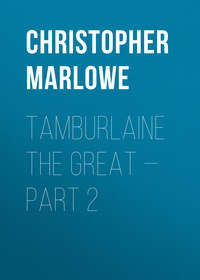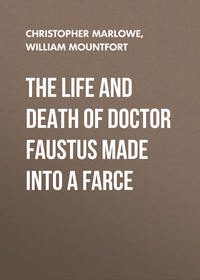The Works of Christopher Marlowe, Vol. 3 (of 3)
 полная версия
полная версияThe Works of Christopher Marlowe, Vol. 3 (of 3)
Жанр: зарубежная драматургиязарубежная классиказарубежная старинная литературапьесы и драматургиясерьезное чтениепьесы, драматургия
Язык: Английский
Год издания: 2018
Добавлена:
Настройки чтения
Размер шрифта
Высота строк
Поля
THE FOURTH SESTIAD
The Argument of the Fourth SestiadHero, in sacred habit deckt,Doth private sacrifice effect.Her scarf's description, wrought by Fate;Ostents that threaten her estate;The strange, yet physical, events,Leander's counterfeit70 presents.In thunder Cyprides descends,Presaging both the lovers' ends:Ecte, the goddess of remorse,With vocal and articulate forceInspires Leucote, Venus' swan,T' excuse the Beauteous Sestian.Venus, to wreak her rites' abuses,Creates the monster Eronusis,Inflaming Hero's sacrificeWith lightning darted from her eyes;And thereof springs the painted beastThat ever since taints every breast.Now from Leander's place she rose, and foundHer hair and rent robe scatter'd on the ground;Which taking up, she every piece did layUpon an altar, where in youth of dayShe us'd t' exhibit private sacrifice:Those would she offer to the deitiesOf her fair goddess and her powerful son,As relics of her late-felt passion;And in that holy sort she vow'd to end them,In hope her violent fancies, that did rend them,Would as quite fade in her love's holy fire,As they should in the flames she meant t' inspire.Then put she on all her religious weeds,That decked her in her secret sacred deeds;A crown of icicles, that sun nor fireCould ever melt, and figur'd chaste desire;A golden star shined in her naked breast,In honour of the queen-light of the east.In her right hand she held a silver wand,On whose bright top Peristera did stand.Who was a nymph, but now transformed a dove,And in her life was dear in Venus' love;And for her sake she ever since that timeChoosed doves to draw her coach through heaven's blue clime.Her plenteous hair in curlèd billows swimsOn her bright shoulder: her harmonious limbsSustained no more but a most subtile veil,That hung on them, as it durst not assailTheir different concord; for the weakest airCould raise it swelling from her beauties fair;Nor did it cover, but adumbrate onlyHer most heart-piercing parts, that a blest eyeMight see, as it did shadow, fearfully,All that all-love-deserving paradise:It was as blue as the most freezing skies;Near the sea's hue, for thence her goddess came:On it a scarf she wore of wondrous frame;In midst whereof she wrought a virgin's face,From whose each cheek a fiery blush did chaseTwo crimson flames, that did two ways extend,Spreading the ample scarf to either end;Which figur'd the division of her mind,Whiles yet she rested bashfully inclin'd,And stood not resolute to wed Leander;This serv'd her white neck for a purple sphere,And cast itself at full breadth down her back:There, since the first breath that begun the wrackOf her free quiet from Leander's lips,She wrought a sea, in one flame, full of ships;But that one ship where all her wealth did pass,Like simple merchants' goods, Leander was;For in that sea she naked figured him;Her diving needle taught him how to swim,And to each thread did such resemblance give,For joy to be so like him it did live:Things senseless live by art, and rational dieBy rude contempt of art and industry.Scarce could she work, but, in her strength of thought,She fear'd she prick'd Leander as she wrought,71And oft would shriek so, that her guardian, frighted,Would startling haste, as with some mischief cited:They double life that dead things' griefs sustain;They kill that feel not their friends' living pain.Sometimes she fear'd he sought her infamy;And then, as she was working of his eye,She thought to prick it out to quench her ill;But, as she prick'd, it grew more perfect still:Trifling attempts no serious acts advance;The fire of love is blown by dalliance.In working his fair neck she did so grace it,She still was working her own arms t' embrace it:That, and his shoulders, and his hands were seenAbove the stream; and with a pure sea-greenShe did so quaintly shadow every limb,All might be seen beneath the waves to swim.In this conceited scarf she wrought besideA moon in change, and shooting stars did glideIn number after her with bloody beams;Which figur'd her affects72 in their extremes,Pursuing nature in her Cynthian body,And did her thoughts running on change imply;For maids take more delight, when they prepare,And think of wives' states, than when wives they are.Beneath all these she wrought a fisherman,73Drawing his nets from forth the ocean;Who drew so hard, ye might discover wellThe toughen'd sinews in his neck did swell:His inward strains drave out his blood-shot eyes,And springs of sweat did in his forehead rise;Yet was of naught but of a serpent sped,That in his bosom flew and stung him dead:And this by Fate into her mind was sent,Not wrought by mere instinct of her intent.At the scarf's other end her hand did frame,Near the fork'd point of the divided flame,A country virgin keeping of a vine,Who did of hollow bulrushes combineSnares for the stubble-loving grasshopper,And by her lay her scrip that nourish'd her.Within a myrtle shade she sate and sung;And tufts of waving reeds above her sprung,Where lurked two foxes, that, while she appliedHer trifling snares, their thieveries did divide,One to the vine, another to her scrip,That she did negligently overslip;By which her fruitful vine and wholesome fareShe suffered spoiled to make a childish snare.These ominous fancies did her soul express,And every finger made a prophetess,To show what death was hid in love's disguise,And make her judgment conquer Destinies.O, what sweet forms fair ladies' souls do shroud,Were they made seen and forcèd through their blood;If through their beauties, like rich work through lawn,They would set forth their minds with virtues drawn,In letting graces from their fingers fly,To still their eyas74 thoughts with industry;That their plied wits in numbered silks might singPassion's huge conquest, and their needles75 leadingAffection prisoner through their own-built cities,Pinioned with stones and Arachnean ditties.Proceed we now with Hero's sacrifice:She odours burned, and from their smoke did riseUnsavoury fumes, that air with plagues inspired;And then the consecrated sticks she fired.On whose pale flames an angry spirit flew,And beat it down still as it upward grew;The virgin tapers that on th' altar stood,When she inflam'd them, burned as red as blood;76All sad ostents of that too near success,77That made such moving beauties motionless.Then Hero wept; but her affrighted eyesShe quickly wrested from the sacrifice,Shut them, and inwards for Leander looked,Search'd her soft bosom, and from thence she pluckedHis lovely picture; which when she had viewed,Her beauties were with all love's joys renewed;The odours sweeten'd, and the fires burned clear,Leander's form left no ill object there:Such was his beauty, that the force of light,Whose knowledge teacheth wonders infinite,The strength of number and proportion,Nature had placed in it to make it known,Art was her daughter, and what human witsFor study lost, entombed in drossy spirits.After this accident (which for her gloryHero could not but make a history),Th' inhabitants of Sestos and AbydosDid every year, with feasts propitious,To fair Leander's picture sacrifice:And they were persons of especial priceThat were allowed it, as an ornamentT' enrich their houses, for the continentOf the strange virtues all approved it held;For even the very look of it repelledAll blastings, witchcrafts, and the strifes of natureIn those diseases that no herbs could cure;The wolfy sting of avarice it would pull,And make the rankest miser bountiful;It kill'd the fear of thunder and of death;The discords that conceit engendereth'Twixt man and wife, it for the time would cease;The flames of love it quench'd, and would increase;Held in a prince's hand, it would put outThe dreadful'st comet; it would ease78 all doubtOf threaten'd mischiefs; it would bring asleepSuch as were mad; it would enforce to weepMost barbarous eyes; and many more effectsThis picture wrought, and sprung79 Leandrian80 sects;Of which was Hero first; for he whose form,Held in her hand, clear'd such a fatal storm,From hell she thought his person would defend her,Which night and Hellespont would quickly send her.With this confirm'd, she vow'd to banish quiteAll thought of any check to her delight;And, in contempt of silly bashfulness,She would the faith of her desires profess,Where her religion should be policy,To follow love with zeal her piety;Her chamber her cathedral-church should be,And her Leander her chief deity;For in her love these did the gods forego;And though her knowledge did not teach her so,Yet did it teach her this, that what her heartDid greatest hold in her self-greatest part,That she did make her god; and 'twas less naughtTo leave gods in profession and in thought,Than in her love and life; for therein liesMost of her duties and their dignities;And, rail the brain-bald world at what it will,That's the grand atheism that reigns in it still.Yet singularity she would use no more,For she was singular too much before;But she would please the world with fair pretext:Love would not leave her conscience perplext:Great men that will have less do for them, stillMust bear them out, though th' acts be ne'er so ill;Meanness must pander be to Excellence;Pleasure atones Falsehood and Conscience:Dissembling was the worst, thought Hero then,And that was best, now she must live with men.O virtuous love, that taught her to do bestWhen she did worst, and when she thought it least!Thus would she still proceed in works divine,And in her sacred state of priesthood shine,Handling the holy rites with hands as bold,As if therein she did Jove's thunder hold,And need not fear those menaces of error,Which she at others threw with greatest terror.O lovely Hero, nothing is thy sin,Weigh'd with those foul faults other priests are in!That having neither faiths, nor works, nor beauties,T' engender any 'scuse for slubbered81 duties,With as much countenance fill their holy chairs,And sweat denouncements 'gainst profane affairs,As if their lives were cut out by their places,And they the only fathers of the graces.Now, as with settled mind she did repairHer thoughts to sacrifice her ravished hairAnd her torn robe, which on the altar lay,And only for religion's fire did stay,She heard a thunder by the Cyclops beaten,In such a volley as the world did threaten,Given Venus as she parted th' airy sphere,Descending now to chide with Hero here:When suddenly the goddess' waggoners,The swans and turtles that, in coupled pheres,82Through all worlds' bosoms draw her influence,Lighted in Hero's window, and from thenceTo her fair shoulders flew the gentle doves,—Graceful Ædone83 that sweet pleasure loves,And ruff-foot Chreste84 with the tufted crown;Both which did kiss her, though their goddess frown.The swans did in the solid flood, her glass,Proin85 their fair plumes; of which the fairest wasJove-lov'd Leucote,86 that pure brightness is;The other bounty-loving Dapsilis.87All were in heaven, now they with Hero were:But Venus' looks brought wrath, and urgèd fear.Her robe was scarlet; black her head's attire:And through her naked breast shin'd streams of fire,As when the rarifièd air is drivenIn flashing streams, and opes the darken'd heaven.In her white hand a wreath of yew she bore;And, breaking th' icy wreath sweet Hero wore,She forc'd about her brows her wreath of yew,And said, "Now, minion, to thy fate be true,Though not to me; endure what this portends:Begin where lightness will, in shame it ends.Love makes thee cunning; thou art current now,By being counterfeit: thy broken vowDeceit with her pied garters must rejoin,And with her stamp thou countenances must coin;Coyness, and pure88 deceits, for purities,And still a maid wilt seem in cozen'd eyes,And have an antic face to laugh within,While thy smooth looks make men digest thy sin.But since thy lips (least thought forsworn) forswore,Be never virgin's vow worth trusting more!"When Beauty's dearest did her goddess hearBreathe such rebukes 'gainst that she could not clear,Dumb sorrow spake aloud in tears and blood,That from her grief-burst veins, in piteous flood,From the sweet conduits of her favour fell.The gentle turtles did with moans make swellTheir shining gorges; the while black-ey'd swansDid sing as woful epicedians,As they would straightways die: when Pity's queen,The goddess Ecte,89 that had ever beenHid in a watery cloud near Hero's cries,Since the first instant of her broken eyes,Gave bright Leucote voice, and made her speak,To ease her anguish, whose swoln breast did breakWith anger at her goddess, that did touchHero so near for that she us'd so much;And, thrusting her white neck at Venus, said:"Why may not amorous Hero seem a maid,Though she be none, as well as you suppressIn modest cheeks your inward wantonness?How often have we drawn you from above,T' exchange with mortals rites for rites in love!Why in your priest, then, call you that offence,That shines in you, and is90 your influence?"With this, the Furies stopp'd Leucote's lips,Enjoin'd by Venus; who with rosy whipsBeat the kind bird. Fierce lightning from her eyesDid set on fire fair Hero's sacrifice,Which was her torn robe and enforcèd hair;And the bright flame became a maid most fairFor her aspèct: her tresses were of wire,Knit like a net, where hearts set all on fire,Struggled in pants, and could not get releast;Her arms were all with golden pincers drest,And twenty-fashioned knots, pulleys, and brakes,And all her body girt with painted snakes;Her down-parts in a scorpion's tail combined,Freckled with twenty colours; pied wings shinedOut of her shoulders; cloth had never dye,Nor sweeter colours never viewèd eye,In scorching Turkey, Cares, Tartary,Than shined about this spirit notorious;Nor was Arachne's web so glorious.Of lightning and of shreds she was begot;More hold in base dissemblers is there not.Her name was Eronusis.91 Venus flewFrom Hero's sight, and at her chariot drewThis wondrous creature to so steep a height,That all the world she might command with sleightOf her gay wings; and then she bade her haste,—Since Hero had dissembled, and disgracedHer rites so much,—and every breast infectWith her deceits: she made her architectOf all dissimulation; and since thenNever was any trust in maids or men.O, it spitedFair Venus' heart to see her most delighted,And one she choos'd, for temper of her mindTo be the only ruler of her kind,So soon to let her virgin race be ended!Not simply for the fault a whit offended,But that in strife for chasteness with the Moon,Spiteful Diana bade her show but oneThat was her servant vow'd, and liv'd a maid;And, now she thought to answer that upbraid,Hero had lost her answer: who knows notVenus would seem as far from any spotOf light demeanour, as the very skin'Twixt Cynthia's brows? sin is asham'd of sin.Up Venus flew, and scarce durst up for fearOf Phœbe's laughter, when she pass'd her sphere:And so most ugly-clouded was the light,That day was hid in day; night came ere night;And Venus could not through the thick air pierce,Till the day's king, god of undaunted verse,Because she was so plentiful a themeTo such as wore his laurel anademe.Like to a fiery bullet made descent,And from her passage those fat vapours rent,That being not throughly rarified to rain,Melted like pitch, as blue as any vein;And scalding tempests made the earth to shrinkUnder their fervour, and the world did thinkIn every drop a torturing spirit flew,It pierc'd so deeply, and it burn'd so blue.Betwixt all this and Hero, Hero heldLeander's picture, as a Persian shield;And she was free from fear of worst success:The more ill threats us, we suspect the less:As we grow hapless, violence subtle grows,Dumb, deaf, and blind, and comes when no man knows.THE FIFTH SESTIAD
The Argument of the Fifth SestiadDay doubles his accustom'd date,As loath the Night, incens'd by Fate,Should wreck our lovers. Hero's plight;Longs for Leander and the night:Which ere her thirsty wish recovers,She sends for two betrothèd lovers,And marries them, that, with their crew,Their sports, and ceremonies due,She covertly might celebrate,With secret joy her own estate.She makes a feast, at which appearsThe wild nymph Teras, that still bearsAn ivory lute, tells ominous tales,And sings at solemn festivals.Now was bright Hero weary of the day,Thought an Olympiad in Leander's stay.Sol and the soft-foot Hours hung on his arms,And would not let him swim, foreseeing his harms:That day Aurora double grace obtain'dOf her love Phœbus; she his horses reign'd,Set92 on his golden knee, and, as she list,She pull'd him back; and as she pull'd she kiss'd,To have him turn to bed: he lov'd her more,To see the love Leander Hero bore:Examples profit much; ten times in one,In persons full of note, good deeds are done.Day was so long, men walking fell asleep;The heavy humours that their eyes did steepMade them fear mischiefs. The hard streets were bedsFor covetous churls and for ambitious heads,That, spite of Nature, would their business ply:All thought they had the falling epilepsy,Men grovell'd so upon the smother'd ground;And pity did the heart of Heaven confound.The Gods, the Graces, and the Muses cameDown to the Destinies, to stay the frameOf the true lovers' deaths, and all world's tears:But Death before had stopp'd their cruel ears.All the celestials parted mourning then,Pierc'd with our human miseries more than men:Ah, nothing doth the world with mischief fill,But want of feeling one another's ill!With their descent the day grew something fair,And cast a brighter robe upon the air.Hero, to shorten time with merriment,For young Alcmane93 and bright Mya sent,Two lovers that had long crav'd marriage-duesAt Hero's hands: but she did still refuse;For lovely Mya was her consort vow'dIn her maid state, and therefore not allow'dTo amorous nuptials: yet fair Hero nowIntended to dispense with her cold vow,Since hers was broken, and to marry her:The rites would pleasing matter ministerTo her conceits, and shorten tedious day.They came; sweet Music usher'd th' odorous way,And wanton Air in twenty sweet forms dancedAfter her fingers; Beauty and Love advancedTheir ensigns in the downless rosy facesOf youths and maids led after by the Graces.For all these Hero made a friendly feast,Welcom'd them kindly, did much love protest,Winning their hearts with all the means she might.That, when her fault should chance t' abide the lightTheir loves might cover or extenuate it,And high in her worst fate make pity sit.She married them; and in the banquet came,Borne by the virgins. Hero striv'd to frameHer thoughts to mirth: ay me! but hard it isTo imitate a false and forcèd bliss;Ill may a sad mind forge a merry face,Nor hath constrainèd laughter any grace.Then laid she wine on cares to make them sink:Who fears the threats of Fortune, let him drink.94To these quick nuptials enter'd suddenlyAdmirèd Teras with the ebon thigh;A nymph that haunted the green Sestian groves,And would consort soft virgins in their loves,At gaysome triumphs and on solemn days,Singing prophetic elegies and lays,And fingering of a silver lute she tiedWith black and purple scarfs by her left side.Apollo gave it, and her skill withal,And she was term'd his dwarf, she was so small:Yet great in virtue, for his beams enclosedHis virtues in her; never was proposedRiddle to her, or augury, strange or new,But she resolv'd it; never slight tale flewFrom her charm'd lips without important sense,Shown in some grave succeeding consequence.This little sylvan, with her songs and tales,Gave such estate to feasts and nuptials,That though ofttimes she forewent tragedies,Yet for her strangeness still she pleas'd their eyes;And for her smallness they admir'd her so,They thought her perfect born, and could not grow.All eyes were on her. Hero did commandAn altar decked with sacred state should standAt the feast's upper end, close by the bride,On which the pretty nymph might sit espied.Then all were silent; every one so hears,As all their senses climb'd into their ears:And first this amorous tale, that fitted wellFair Hero and the nuptials, she did tell.The Tale of TerasHymen, that now is god of nuptial rites,And crowns with honour Love and his delights,Of Athens was a youth, so sweet of face,That many thought him of the female race;Such quickening brightness did his clear eyes dart,Warm went their beams to his beholder's heart,In such pure leagues his beauties were combin'd,That there your nuptial contracts first were signed;For as proportion, white and crimson, meetIn beauty's mixture, all right clear and sweet,The eye responsible, the golden hair,And none is held, without the other, fair;All spring together, all together fade;Such intermix'd affections should invadeTwo perfect lovers; which being yet unseen,Their virtues and their comforts copied beenIn beauty's concord, subject to the eye;And that, in Hymen, pleased so matchlessly,That lovers were esteemed in their full grace,Like form and colour mixed in Hymen's face;And such sweet concord was thought worthy thenOf torches, music, feasts, and greatest men:So Hymen look'd that even the chastest mindHe mov'd to join in joys of sacred kind;For only now his chin's first down consortedHis head's rich fleece in golden curls contorted;And as he was so loved, he loved so too:So should best beauties bound by nuptials, do.Bright Eucharis, who was by all men saidThe noblest, fairest, and the richest maidOf all th' Athenian damsels, Hymen lov'dWith such transmission, that his heart remov'dFrom his white breast to hers: but her estate,In passing his, was so interminateFor wealth and honour, that his love durst feedOn naught but sight and hearing, nor could breedHope of requital, the grand prize of love;Nor could he hear or see, but he must proveHow his rare beauty's music would agreeWith maids in consort; therefore robbèd heHis chin of those same few first fruits it bore,And, clad in such attire as virgins wore,He kept them company, and might right well,For he did all but Eucharis excelIn all the fair of beauty! yet he wantedVirtue to make his own desires implantedIn his dear Eucharis; for women neverLove beauty in their sex, but envy ever.His judgment yet, that durst not suit address,Nor, past due means, presume of due success,Reason gat Fortune in the end to speedTo his best prayers95: but strange it seemed, indeed,That Fortune should a chaste affection bless:Preferment seldom graceth bashfulness.Nor grac'd it Hymen yet; but many a dart,And many an amorous thought, enthralled96 his heart,Ere he obtained her; and he sick became,Forced to abstain her sight; and then the flameRaged in his bosom. O, what grief did fill him!Sight made him sick, and want of sight did kill him.The virgins wonder'd where Diætia stay'd,For so did Hymen term himself, a maid.At length with sickly looks he greeted them:Tis strange to see 'gainst what an extreme streamA lover strives; poor Hymen look'd so ill,That as in merit he increasèd stillBy suffering much, so he in grace decreas'd:Women are most won, when men merit least:If Merit look not well, Love bids stand by;Love's special lesson is to please the eye.And Hymen soon recovering all he lost,Deceiving still these maids, but himself most,His love and he with many virgin dames,Noble by birth, noble by beauty's flames,Leaving the town with songs and hallow'd lightsTo do great Ceres Eleusina ritesOf zealous sacrifice, were made a preyTo barbarous rovers, that in ambush lay,And with rude hands enforc'd their shining spoil,Far from the darkened city, tired with toil:And when the yellow issue of the skyCame trooping forth, jealous of crueltyTo their bright fellows of this under-heaven,Into a double night they saw them driven,—A horrid cave, the thieves' black mansion;Where, weary of the journey they had gone,Their last night's watch, and drunk with their sweet gains,Dull Morpheus enter'd, laden with silken chains,Stronger than iron, and bound the swelling veinsAnd tirèd senses of these lawless swains.But when the virgin lights thus dimly burn'd,O, what a hell was heaven in! how they mourn'dAnd wrung their hands, and wound their gentle formsInto the shapes of sorrow! golden stormsFell from their eyes; as when the sun appears,And yet it rains, so show'd their eyes their tears:And, as when funeral dames watch a dead corse,Weeping about it, telling with remorseWhat pains he felt, how long in pain he lay,How little food he ate, what he would say;And then mix mournful tales of other's deaths,Smothering themselves in clouds of their own breaths;At length, one cheering other, call for wine;The golden bowl drinks tears out of their eyne,As they drink wine from it; and round it goes,Each helping other to relieve their woes;So cast these virgins' beauties mutual rays,One lights another, face the face displays;Lips by reflection kissed, and hands hands shook,Even by the whiteness each of other took.But Hymen now used friendly Morpheus' aid,Slew every thief, and rescued every maid:And now did his enamour'd passion takeHeart from his hearty deed, whose worth did makeHis hope of bounteous Eucharis more strong;And now came Love with Proteus, who had longJuggled the little god with prayers and gifts,Ran through all shapes and varied all his shifts,To win Love's stay with him, and make him love him.And when he saw no strength of sleight could move him,To make him love or stay, he nimbly turnedInto Love's self, he so extremely burned.And thus came Love, with Proteus and his power,T' encounter Eucharis: first, like the flowerThat Juno's milk did spring,97 the silver lily,He fell on Hymen's hand, who straight did spyThe bounteous godhead, and with wondrous joyOffer'd it Eucharis. She, wonderous coy,Drew back her hand: the subtle flower did woo it,And, drawing it near, mixed so you could not know it:As two clear tapers mix in one their light,So did the lily and the hand their white.She viewed it; and her view the form bestowsAmongst her spirits; for, as colour flowsFrom superficies of each thing we see,Even so with colours forms emitted be;And where Love's form is, Love is; Love is form:He entered at the eye; his sacred stormRose from the hand, Love's sweetest instrument:It stirred her blood's sea so, that high it went,And beat in bashful waves 'gainst the white shoreOf her divided cheeks; it raged the more,Because the tide went 'gainst the haughty windOf her estate and birth: and, as we find,In fainting ebbs, the flowery Zephyr hurlsThe green-haired Hellespont, broke in silver curls,'Gainst Hero's tower; but in his blast's retreat,The waves obeying him, they after beat,Leaving the chalky shore a great way pale,Then moist it freshly with another gale;So ebbed and flowed the blood98 in Eucharis' face,Coyness and Love strived which had greatest grace;Virginity did fight on Coyness' side,Fear of her parent's frowns and female prideLoathing the lower place, more than it lovesThe high contents desert and virtue moves.With Love fought Hymen's beauty and his valure,99Which scarce could so much favour yet allureTo come to strike, but fameless idle stood:Action is fiery valour's sovereign good.But Love, once entered, wished no greater aidThan he could find within; thought thought betray'd;The bribed, but incorrupted, garrisonSung "Io Hymen;" there those songs begun,And Love was grown so rich with such a gain,And wanton with the ease of his free reign,That he would turn into her roughest frownsTo turn them out; and thus he Hymen crownsKing of his thoughts, man's greatest empery:This was his first brave step to deity.Home to the mourning city they repair,With news as wholesome as the morning air,To the sad parents of each savèd maid:But Hymen and his Eucharis had laidThis plat100 to make the flame of their delightRound as the moon at full, and full as bright.Because the parents of chaste EucharisExceeding Hymen's so, might cross their bliss;And as the world rewards deserts, that lawCannot assist with force; so when they sawTheir daughter safe, take vantage of their own,Praise Hymen's valour much, nothing bestown;Hymen must leave the virgins in a groveFar off from Athens, and go first to prove,If to restore them all with fame and life,He should enjoy his dearest as his wife.This told to all the maids, the most agree:The riper sort, knowing what 'tis to beThe first mouth of a news so far derived,And that to hear and bear news brave folks lived.As being a carriage special hard to bearOccurrents, these occurrents being so dear,They did with grace protest, they were contentT' accost their friends with all their compliment,For Hymen's good; but to incur their harm,There he must pardon them. This wit went warmTo Adolesche's101 brain, a nymph born high,Made all of voice and fire, that upwards fly:Her heart and all her forces' nether trainClimb'd to her tongue, and thither fell her brain,Since it could go no higher; and it must go;All powers she had, even her tongue, did so:In spirit and quickness she much joy did take,And loved her tongue, only for quickness' sake;And she would haste and tell. The rest all stay:Hymen goes one, the nymph another way;And what became of her I'll tell at last:Yet take her visage now;—moist-lipped, long-faced,Thin like an iron wedge, so sharp and tart,As 'twere of purpose made to cleave Love's heart:Well were this lovely beauty rid of her.And Hymen did at Athens now preferHis welcome suit, which he with joy aspired:A hundred princely youths with him retiredTo fetch the nymphs; chariots and music went;And home they came: heaven with applauses rent.The nuptials straight proceed, whiles all the town,Fresh in their joys, might do them most renown.First, gold-locked Hymen did to church repair,Like a quick offering burned in flames of hair;And after, with a virgin firmamentThe godhead-proving bride attended wentBefore them all: she looked in her command,As if form-giving Cypria's silver handGripped all their beauties, and crushed out one flame;She blushed to see how beauty overcameThe thoughts of all men. Next, before her wentFive lovely children, decked with ornamentOf her sweet colours, bearing torches by;For light was held a happy auguryOf generation, whose efficient rightIs nothing else but to produce to light.The odd disparent number they did choose,To show the union married loves should use,Since in two equal parts it will not sever,But the midst holds one to rejoin it ever,As common to both parts: men therefore deemThat equal number gods do not esteem,Being authors of sweet peace and unity,But pleasing to th' infernal empery,Under whose ensigns Wars and Discords fight,Since an even number you may disuniteIn two parts equal, naught in middle leftTo reunite each part from other reft;And five they hold in most especial prize,102Since 'tis the first odd number that doth riseFrom the two foremost numbers' unity,That odd and even are; which are two and three;For one no number is; but thence doth flowThe powerful race of number. Next, did goA noble matron, that did spinning bearA huswife's rock and spindle, and did wearA wether's skin, with all the snowy fleece,To intimate that even the daintiest pieceAnd noblest-born dame should industrious be:That which does good disgraceth no degree.And now to Juno's temple they are come,Where her grave priest stood in the marriage-room:On his right arm did hang a scarlet veil,And from his shoulders to the ground did trail,On either side, ribands of white and blue:With the red veil he hid the bashful hueOf the chaste bride, to show the modest shame,In coupling with a man, should grace a dame.Then took he the disparent silks, and tiedThe lovers by the waists, and side to side,In token that thereafter they must bindIn one self-sacred knot each other's mind.Before them on an altar he presentedBoth fire and water, which was first invented,Since to ingenerate every human creatureAnd every other birth produc'd by Nature,Moisture and heat must mix; so man and wifeFor human race must join in nuptial life.Then one of Juno's birds, the painted jay,He sacrific'd and took the gall away;All which he did behind the altar throw,In sign no bitterness of hate should grow,'Twixt married loves, nor any least disdain.Nothing they spake, for 'twas esteem'd too plainFor the most silken mildness of a maid,To let a public audience hear it said,She boldly took the man; and so respectedWas bashfulness in Athens, it erectedTo chaste Agneia,103 which is Shamefacedness,A sacred temple, holding her a goddess.And now to feasts, masks, and triumphant shows,The shining troops returned, even till earth-throesBrought forth with joy the thickest part of night,When the sweet nuptial song, that used to citeAll to their rest, was by Phemonöe104 sung,First Delphian prophetess, whose graces sprungOut of the Muses' well: she sung beforeThe bride into her chamber; at which doorA matron and a torch-bearer did stand:A painted box of confits105 in her handThe matron held, and so did other some106That compassed round the honour'd nuptial room.The custom was, that every maid did wear,During her maidenhead, a silken sphereAbout her waist, above her inmost weed,Knit with Minerva's knot, and that was freedBy the fair bridegroom on the marriage-night,With many ceremonies of delight:And yet eternized Hymen's tender bride,To suffer it dissolved so, sweetly cried.The maids that heard, so loved and did adore her,They wished with all their hearts to suffer for her.So had the matrons, that with confits stoodAbout the chamber, such affectionate blood,And so true feeling of her harmless pains,That every one a shower of confits rains;For which the bride-youths scrambling on the ground,In noise of that sweet hail her107 cries were drown'd.And thus blest Hymen joyed his gracious bride,And for his joy was after deified.The saffron mirror by which Phœbus' love,Green Tellus, decks her, now he held aboveThe cloudy mountains: and the noble maid,Sharp-visaged Adolesche, that was stray'dOut of her way, in hasting with her news,Not till this108 hour th' Athenian turrets views;And now brought home by guides, she heard by all,That her long kept occurrents would be stale,And how fair Hymen's honours did excelFor those rare news which she came short to tell.To hear her dear tongue robbed of such a joy,Made the well-spoken nymph take such a toy,109That down she sunk: when lightning from aboveShrunk her lean body, and, for mere free love,Turn'd her into the pied-plum'd Psittacus,That now the Parrot is surnam'd by us,Who still with counterfeit confusion pratesNaught but news common to the common'st mates.—This told, strange Teras touch'd her lute, and sungThis ditty, that the torchy evening sprung.Epithalamion TeratosCome, come, dear Night! Love's mart of kisses,Sweet close to his ambitious line,The fruitful summer of his blisses!Love's glory doth in darkness shine.O come, soft rest of cares! come, Night!Come, naked Virtue's only tire,The reapèd harvest of the light,Bound up in sheaves of sacred fire!Love calls to war;Sighs his alarms,Lips his swords are,The field his arms.Come, Night, and lay thy velvet handOn glorious Day's outfacing face;And all thy crownèd flames command,For torches to our nuptial grace!Love calls to war;Sighs his alarms,Lips his swords are,The field his arms.No need have we of factious Day,To cast, in envy of thy peace,Her balls of discord in thy way:Here Beauty's day doth never cease;Day is abstracted here,And varied in a triple sphere.Hero, Alcmane, Mya, so outshine thee,Ere thou come here, let Thetis thrice refine thee.Love calls to war;Sighs his alarms,Lips his swords are,The field his arms.The evening star I see:Rise, youths! the evening starHelps Love to summon war;Both now embracing be.Rise, youths! Love's rite claims more than banquets; rise!Now the bright marigolds, that deck the skies,Phœbus' celestial flowers, that, contraryTo his flowers here, ope when he shuts his eye,And shuts when he doth open, crown your sports:Now Love in Night, and Night in Love exhortsCourtship and dances: all your parts employ,And suit Night's rich expansure with your joy.Love paints his longings in sweet virgins' eyes:Rise, youths! Love's rite claims more than banquets; rise!Rise, virgins! let fair nuptial loves enfoldYour fruitless breasts: the maidenheads110 ye holdAre not your own alone, but parted are;Part in disposing them your parents share,And that a third part is; so must ye saveYour loves a third, and you your thirds must have.Love paints his longings in sweet virgins' eyes:Rise, youths! Love's rite claims more than banquets; rise!Herewith the amorous spirit, that was so kindTo Teras' hair, and comb'd it down with wind,Still as it, comet-like, brake from her brain,Would needs have Teras gone, and did refrainTo blow it down: which, staring111 up, dismay'dThe timorous feast; and she no longer stay'd;But, bowing to the bridegroom and the bride,Did, like a shooting exhalation, glideOut of their sights: the turning of her backMade them all shriek, it look'd so ghastly black.O hapless Hero! that most hapless cloudThy soon-succeeding tragedy foreshow'd.Thus all the nuptial crew to joys depart;But much-wronged112 Hero stood Hell's blackest dart:Whose wound because I grieve so to display,I use digressions thus t' increase the day.









